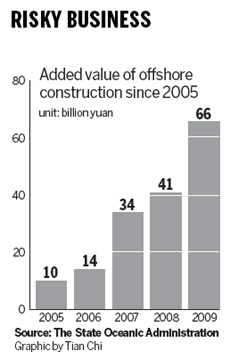Coastal development threatens ecosystem
Soaring investment in coastal construction projects may endanger the biological diversity of the ecosystem and increase the risk of flooding, authorities said on Tuesday.
The construction of offshore projects in the country last year reached 66 billion yuan ($9.7 billion), an increase of 32 percent year on year, according to State Oceanic Administration (SOA) figures.
As coastal development has recently become a new growth area in China, land reclamation is increasingly claiming offshore wetland, which damages the fragile marine ecosystem.
From 2006 to 2007, the illegal reclamation of land reached 189 square kilometers. The fines imposed for disturbing offshore wetlands yielded less than 5 billion yuan, SOA figures show.
"We are taking a series of measures to avoid illegal land reclamation and supervising the ocean development plan for the coastal areas," Wang Dianchang, director of the SOA's department of planning, policies, laws and regulations, said.
Along with the SOA, the National Development and Reform Commission (NDRC) jointly issued a notice to strengthen the management of land reclamation.
While the cost per square meter for coastal reclamation projects generally ranges from 220 to 520 yuan, the cost to build on land is thousands of yuan per square meters, so projects on reclaimed land are much less expensive.
"The bio-environment of our oceans has deteriorated over the past few years due to fast offshore development and increasing land reclamation from the sea," Cui Shenghui, from the Urban Environment Institute at the Chinese Academy of Sciences, told China Daily.
Land reclamation is a process in which natural and man-made materials are added to coastal areas and waterfronts in an attempt to make them more solid, essentially creating new land surfaces.
Cui said over-reclamation of coastal land will influence the biological diversity of marine life and, possibly, change the ocean's functions.
As a result of land reclamation affecting the direction of water currents, some fish cannot swim to certain places to lay their eggs and eventually will become extinct, he said.
"Wetlands help control floods, prevent soil erosion and can both remove and store greenhouse gases from the Earth's atmosphere," he added.
Every year China allows about 120 square kilometres of sea to be used for land reclamation, Wang said.
 |
|
[China Daily] |
An annual report from the SOA shows that the ecological environment of the 11 coastal provinces was seriously damaged by land reclamation, pollution and coastal erosion.
According to the relevant laws, anyone involved in illegal land reclamation projects will be fined five to 15 times what he paid for the project. In 2008, the SOA issued fines totaling 27 million yuan for illegal coastal reclamation.
In January, a court ordered the developer of an illegal luxury villa floating on the sea in Guangdong province to return the occupied sea.
Last year, the government planned to develop Hainan into a top international tourist destination, including building a five-star hotel on a man-made island in Haikou.
In total, the added value created by coastal tourism reached 375 billion yuan last year, a year-on-year increase of 12.3 percent.
 0
0 







Go to Forum >>0 Comments